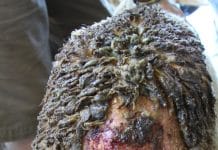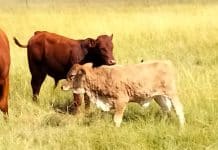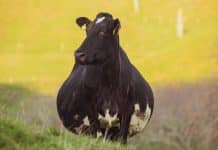Estimated reading time: 7 minutes
The challenge of making genetic progress in beef cattle breeding in a communal area where hundreds of cows and bulls roam free, will be tackled through a co-operative. Five emerging cattle farmers have set up the co-operative not only to promote their own businesses, but also to bring success to fellow cattle farmers in their community.
Find out more about why cattle need to be dipped here.
Stepping up to the plate
Not many owners castrate their bull calves, resulting in quite a number of bulls that are ready to serve heifers or cows. Many of these bulls are genetically inferior and cause the communal cow herd to regress rather than improve.
This is one of the aspects that bothered Peter Moroka of the Ga-Seleka region in northwest Limpopo. It served as an incentive to establish the Moedi wa Dikgomo Co-operative (which means ‘the valley of the cow’) to enhance co-operation, learning and experience between the members, and to encourage one another to apply the correct farming practices. The co-operative is already bearing fruit, but there are still major challenges.
After he completed his schooling he worked for several large companies, and in 2015 Peter decided to follow his passion and start farming beef cattle full-time. He initially bought 15 cows but during the drought, nine of them died. Today, he has 13 cows and a Simbra-type bull and plans to expand his herd by utilising a superior Bonsmara bull.
In 2017, he and four other emerging farmers founded the co-operative, and together they have around 60 cows that are kept along with some 1 000 other animals on the communal land. The purpose of the co-operative is to allow the members to grow together. For that they need training and a mentor, says Peter, who is the chief executive officer of Moedi wa Dikgomo.
Since the co-operative’s inception, the group has completed two training courses hosted by the Red Meat Producers’ Organisation (RPO) on marketing and herd management. Although they arranged the courses, it was open to other farmers in the community to share in the training.
Read more about Covid-19 and its risk to livestock here.
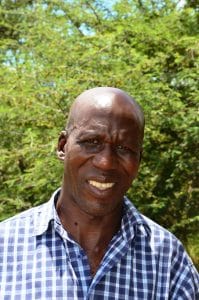
Empowering others
Some of the farmers who received training have progressed significantly. In the past, medication was administered to animals on a hit-and-miss basis. Nowadays, they follow the directions on the label describing why it should be used and how it should be administered. This resulted in fewer sick animals in the communal herd.
Last year, lumpy skin disease presented a major challenge. Those who received training were able to treat the animals correctly and on time, and avoided the disease, while the animals of the farmers who still farm traditionally suffered severely.
Each of the five members of the co-operative has a task. Peter represents the co-operative at various levels and then reports back to the other members on matters of interest. Mmaphuti Moruane is the chairperson and driving force who encourages members to take action. Thaluki Ngoepe is the vice-chairperson, Christo Craill the secretary and Daniel Kobo the treasurer.
Peter represented the group at the last Sernick Emerging Farmers’ Day, and he was astounded at the quality of the animals he saw there. He found it to be a very informative experience and was impressed by how Nic Serfontein involves emerging farmers from his area in the process of obtaining breeding animals – Sernick purchases the offspring of these animals for its feedlot.
This way he helps the farmers to farm more successfully by using outstanding animals in their herds and to provide weaner calves that he knows have the potential to do well in the feedlot, Peter explains.
“We need a Sernick in Limpopo as a mentor to help emerging farmers get on the path towards commercial production. Many of our people are still trapped in the tradition that cattle only symbolise wealth while, in reality, they do not generate wealth,” he says.
One step at a time
Although the Moedi wa Dikgomo co-operative is registered, says Peter, it is still in its infancy. They aim to first become stable, build up assets, and then invite farmers to join the co-operative as members, and even acquire shares in the business.
The five members pool their buying power when acquiring necessities for their respective farms and share their knowledge and the information available in a bid to improve their farming practices. During the severe drought a year or so ago, they negotiated on behalf of all the farmers in the community to obtain feed and assistance.
Their current goal is to buy a purebred Bonsmara bull that is adapted to their environment and farming challenges, to achieve their goal of farming more profitably and make a living from beef cattle production. They have their sights set on the bull, Pietertjie, which comes from the well-known Bufland Bonsmara Stud near Mookgophong in Limpopo.
Lukas Eksteen from Bufland, who is familiar with the farming conditions at Ga-Seleka, recommended the bull especially for them. It is a medium-frame bull that will be able to perform well amid the demanding conditions, and at the same time produce offspring that will carry more meat and will significantly increase their chances of profitability.
However, the project does come with an immediate challenge. The aim is to use the bull on their best cows and heifers to speed up the improvement of their herds. Yet if the bull is used in the existing communal system, its benefits may become lost in the larger herd, and they will not be able to take full advantage of its genetic traits.
One of the solutions they are investigating is to enter into an agreement with a commercial producer in the area, to let their best cows and the bull run in a fenced-off area for at least the mating season. Such an agreement can, among other things, make it possible for the producer to mate some of his cows with Pietertjie. This way, he can share in the benefits.
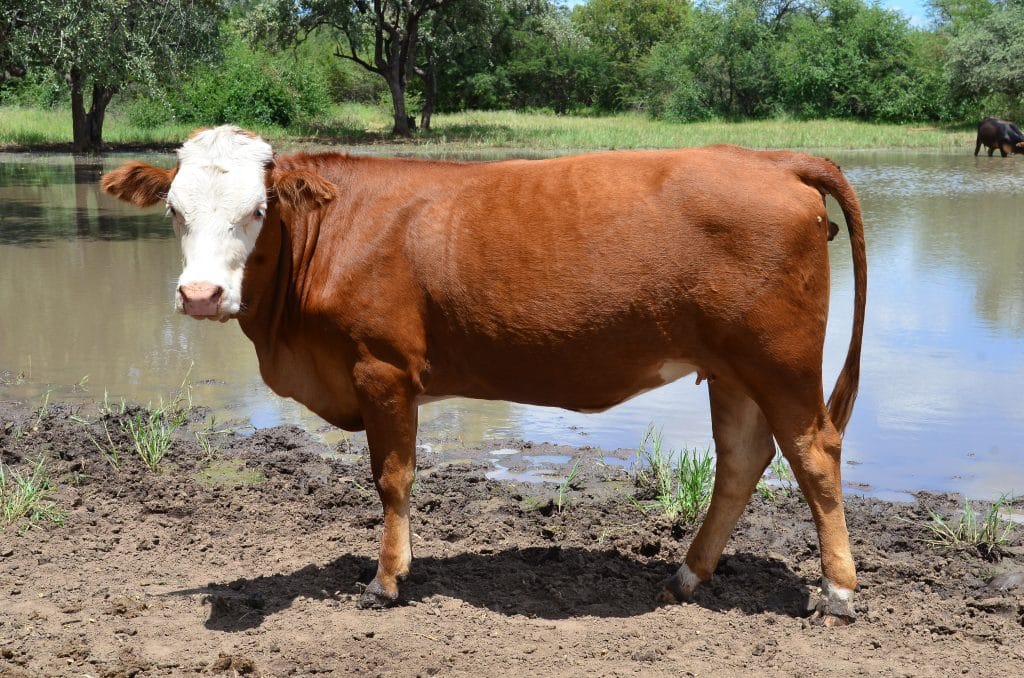
The way forward
Peter says some of the communal farmers are still slow to accept cattle as a commodity, with many farmers still perceiving cattle as something to brag about and not as a means of income. Be that as it may, the Moedi wa Dikgomo co-operative hopes to achieve so much success that it will help convince the other farmers to join them on the road to commercial success.
Management remains one of the biggest obstacles in the communal system. For example, there is no place to select heifers and cows, isolate them and then use a superior bull on them to make genetic progress. He thinks that if government is serious about helping emerging farmers, it can, in terms of the Livestock Improvement Act, 1977 (Act 25 of 1977), appoint selectors or officials who will ensure that inferior bull calves in the communal areas are castrated so they will not hamper farmers’ progress. In addition, mentors are needed to transfer their expertise and experience to these new farmers.
Read more about cattle breeding mentorship here.
Without such support and assistance, he sees difficulty ahead for communal farmers who want to progress to the commercially profitable level of beef production. People who have a passion for cattle farming must be identified to walk this path successfully.
Peter’s dream is to have his own piece of land within ten years, on which he can farm around 100 excellent breeding cows. – Andries Gouws, Stockfarm
For more information, contact Peter Moroka on 078 654 2428.



